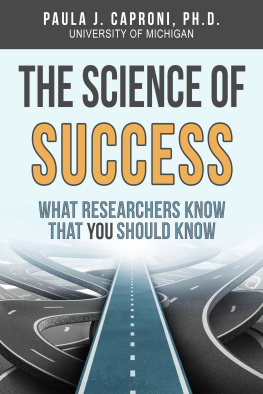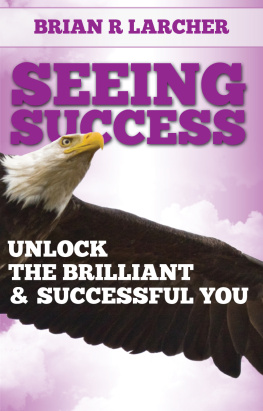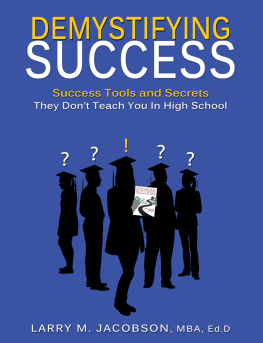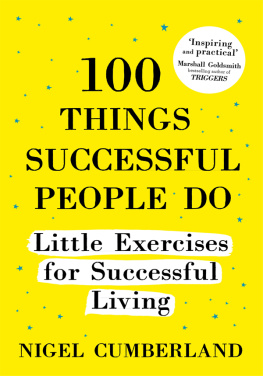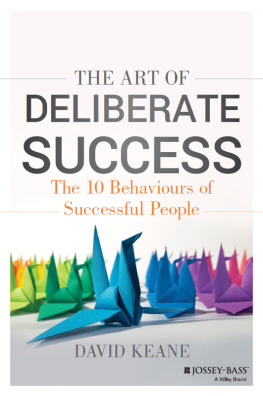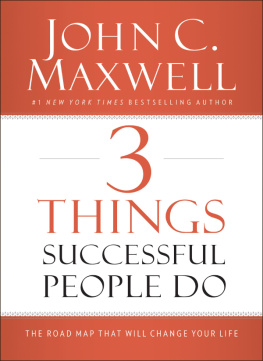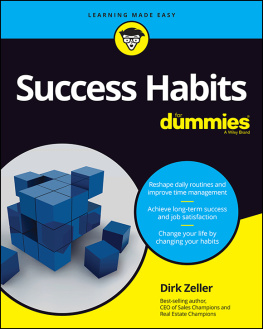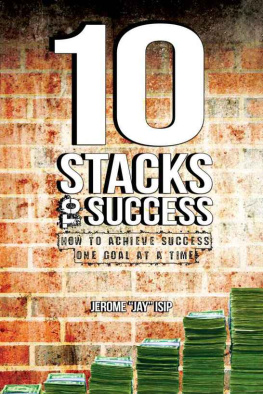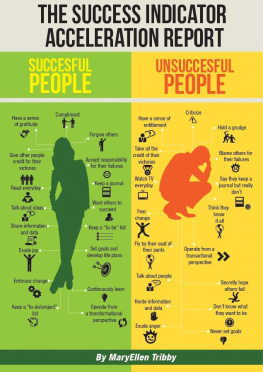THE SCIENCE OF SUCCESS:
What Researchers Know that You Should Know
By Paula J. Caproni, Ph.D.
University of Michigan
Copyright 2017 Paula J. Caproni
All rights reserved. No part of this book may be reproduced, stored in a retrieval system, or transmitted, in any form or by any means (electronic, mechanical, photocopying, recording, or otherwise), without prior written permission from the copyright holder or the publisher, except in the case of brief quotations in articles or reviews.
Published by Van Rye Publishing, LLC
www.vanryepublishing.com
ISBN-10: 0-9970566-9-X
ISBN-13: 978-0-9970566-9-3
Table of Contents
About the Author
P aula J. Caproni is a faculty member in the Management and Organizations Department at the Ross School of Business at the University of Michigan. Professor Caproni received her MBA from the University of Massachusetts and her Ph.D. in Organizational Behavior from Yale University. In addition to teaching about leadership skills, effective coaching, developing power and influence, and creating high-performing teams in the University of Michigan MBA and Executive Programs, she has served as the Academic Director of the Full-Time and Part-Time MBA Programs. She has coached over 500 executives and served as the lead Professional Development Coach for the Executive MBA Program and several Executive Education programs.
Professor Caproni has taught in Executive Education programs in Brazil, Chile, China, Colombia, Finland, Germany, Hong-Kong, Malaysia, Nigeria, Poland, Saudi Arabia (Riyadh), South Korea, Sweden, Thailand, the Philippines, and Vietnam. She has worked with a variety of organizations, including Asian Development Bank, Ascension Health, Avon, Bank Saudi Fransi, Bank of America, Bank Negara, Bendix, Boehringer Ingelheim, Cigna Asia, Exxon, Consumers Energy, DTE Energy, Flagstar Bank, Ford Motor Company, Ford Medical Group, Internal Revenue Service, Lexmark, Management Sciences for Health, Mead Johnson, M & T Bank, Mopar, National Arts Strategies, the NFL, Nokia, Onninen, Philips, Phelps-Dodge, Roland Berger Chemicals, Saudi Telecom, Seminarium, University of Michigan Sports Management Program, and Wachovia.
Professor Caproni received the Victor Bernard Award for Leadership in Teaching at the Ross School of Business, as well as the Executive Education Teaching Impact Award. Her book Management Skills for Everyday Life: The Practical Coach is now in its third edition. Her article Work Life Balance: You Cant Get There From Here received the McGregor Award from the Journal of Applied Behavioral Science.
Dedication
For Julia and Leah, with love.
Acknowledgments
I thank my two daughters, Julia and Leah, for thoughtfully editing every chapter of this book and for being my inspiration and the joy of my life.
I thank Bill for wholeheartedly supporting my efforts to write this book, as well as every effort that Ive undertaken since the day we met.
I thank my late parents, Cecilia and Enrico, and grandmother, Maria, for the sacrifices they made to create a better life for their children and grandchildren.
I thank my sister, Sandi, who, while I was teaching out of the country many years ago, flew out to Michigan to save Halloween for my daughters after my youngest daughter tearfully declared, There will be no Halloween without Mom. Sandi and her husband Wayne have come through many times for my daughters and have gotten me out of trouble more times than I can count.
I thank my sister Laura and her husband Cory for their parties that bring out the best in everyone.
I thank Liam McGehee Marley for helping me with some of the early research for this book. His enthusiasm and wisdom added significant value to the book.
I thank my colleagues in the Management and Organizations Department, the Ross School of Business, and the University of Michigan for providing me with more support and encouragement than I ever thought possible in a workplace.
I thank the students and executives who have shared their dreams with me and given me the privilege of working with and learning from them.
I thank the many researchers who made this book possible because their research provides a strong foundation that enables people to build successful, happy, and healthy lives.
I thank Professors George Siedel, Wally Hopp, and Gautam Kaul for enthusiastically encouraging me to create my online Coursera course about the Science of Success, as well as Dave Malicke and Alex Hancook at the University of Michigan Office of Academic Innovation for turning my ideas into the final version of the course. The Coursera course, based on this book, would not have seen the light of day without their unflagging support and technical expertise.
I thank Cat Woods (http://www.linkedin.com/in/catwoods1) not only for her indispensable editing, but for her candid feedback on the content of the book. She challenged me to clarify my thinking, my voice, and my purpose while writing a research-based book.
I thank John Siedel at Van Rye Publishing for his patience, professionalism, and vision. A publisher extraordinaire and a pleasure to work with, John encouraged me to turn a set of loose ideas into a cohesive and impactful story.
Introduction
T his is the book I wish I had when I was younger. Like most people, I learned about success through the school of hard knocks, taking two steps forward and one step backward. I dont come from a family that talked about success. For the first 25 years of my life, I never even thought about what success would look or feel like, never mind how to achieve it.
Born in the U.S., I am the daughter of an Italian immigrant father and a Polish American mother. Neither of my parents finished high school, and my Italian grandmother (my Nonna, the only grandparent who lived long enough for me to get to know and who helped raise me) never finished elementary school. We lived in an apartment upstairs from the family luncheonette until I was 12 years old. My two sisters and I were first generation high school students, as well as first generation college students.
Im very proud of my family background. In our home my siblings and I learned many precious lessons about relationships, respect, and responsibility. These lessons continue to serve me well and, as youll read later in this book, are significant predictors of success. While we had plenty of conversations at home, we didnt talk about our hopes and dreams for the future, and we certainly didnt talk about meaningful jobs or career paths. We lived very much in the moment, managing to pay the bills during the week and on weekends meeting at the Italian grove where we watched the old men play bocce and the old women (some with soft white hair that was dyed pale blue, long before it became fashionable) play cards.
Fast forward to today. After making my way through community college, a part-time undergraduate program while I worked full time, an MBA program, and a Ph.D. program in Organizational Behavior at Yale University, I joined the faculty of the Ross School of Business at the University of Michigan. For close to 30 years, I have been teaching courses about leadership and high-performing teams to MBA students and a variety of other graduate students, and to executives globally. I have coached over 500 executives to help them discover pathways to their short-term and long-term goals. Given my early background, its no surprise that I often wondered, How on earth did I get here?
Throughout my years at the University of Michigan Ross School of Business, and through my own consulting work, Ive had many conversations with graduate students and executives about their life goals and their progress toward achieving those goals. Many were heading toward the success that they desired, and some werent. Some came from privileged backgrounds, but many didnt. Some already had the external markers of successa high-status job, a big house, a new carbut they werent happy. Some didnt have the external markers of success and were delighted with their lives. Some knew at a young age what they wanted to be when they grew up; others (like me) didnt find their way until they were much older; and some were still finding their way. Through these conversations, my interest grew from How did

